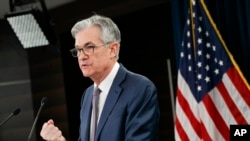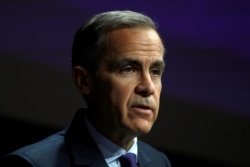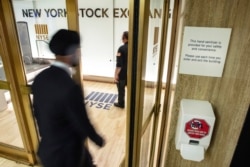The U.S. Federal Reserve took the unexpected step on Tuesday of cutting its target interest rate by half of one percentage point, joining policymakers across the globe in an effort to prevent the spreading coronavirus outbreak from plunging the world economy into recession.
The action by the U.S. central bank followed the announcement earlier Tuesday that central banks in Australia and Malaysia had lowered their rates, and sparked speculation that their counterparts in other countries would follow suit.
The Bank of Japan and the Reserve Bank of India have both indicated readiness to take action if necessary. Analysts in Europe, where some interest rates are at or below zero, said that they expected the European Central Bank to lower them further.
In Britain, Mark Carney, governor of the Bank of England, said the institution's Monetary Policy Committee was assessing the effects of the virus, and "will come to quick conclusions about the appropriate stance of policy."
In a joint statement on Monday, the International Monetary Fund and the World Bank both pledged "emergency financing, policy advice and technical assistance" to countries whose economies are damaged by the spreading virus.
China, the epicenter of the virus, has announced a raft of policy measures meant to help its economy recover, including lower interest rates, tax cuts and changes to accounting rules that allow lenders to avoid writing down bad debts.
In the U.S. and around the world, the impact of the rate cuts announced today was unclear. After a brief jump when the Fed's move was announced, stock markets plunged again, as investors moved money into bonds and other assets viewed as less affected by short-term risks.
The move by the Fed was unusual because the central bank almost always waits until scheduled meetings of its Open Market Committee to change interest rates. Tuesday morning, Fed Chairman Jerome Powell told reporters that the decision was made to lower the target range to between 1% and 1.25% on an emergency basis because the virus is already having a demonstrable negative impact on the global economy.
"The outbreak has disrupted economic activity in many countries and prompted significant movements in financial markets," Powell said. The Fed chief has long been under pressure from President Donald Trump to lower interest rates and bring them more in line with those in Europe.
The move surprised experts in the United States, who as recently as Tuesday morning had been predicting that the Fed would wait until its next meeting in two weeks to lower rates. The last time the Fed cut rates outside the context of a scheduled FOMC meeting was in the midst of the financial crisis of 2008.
"The Fed must have figured that moving early and decisively was more important than waiting for a meeting," said David M. Wessel, director of the Hutchins Center on Fiscal and Monetary Policy at the Brookings Institution in Washington. "There's always a risk that when they do something like this, people think, 'Oh, things must be even worse than I thought.' But I think they must have figured it's important to get ahead of the curve here."
The Fed response came just hours after the finance ministers and central bank governors of the G-7 — representing the largest economies in the world — issued a statement that gave no hint of imminent action.
The G-7 statement said that leaders were "monitoring" the impact of the virus on markets, and that "G-7 central banks will continue to fulfill their mandates, thus supporting price stability and economic growth while maintaining the resilience of the financial system."
However, it fell short of committing to any specific action. The U.S., and by extension the Federal Reserve, were both parties to that statement.
World leaders are struggling to respond to the fast-moving virus that has spread to a minimum of 60 countries on every continent except Antarctica. The global toll so far is more than 90,000 confirmed cases and more than 3,000 deaths. The vast majority of both have been in China, where the virus first emerged in December.
Government responses in a number of countries, including China and the United States, have raised concerns about the readiness of public institutions to cope with such an unprecedented global health crisis.
In China, the government tried to suppress news about the virus when it first appeared, potentially allowing it more time to spread.
In the United States, virus test kits provided by the Centers for Disease Control and Prevention were defective, and the government has been slow to roll out replacements, putting the country weeks behind in the effort to track how widespread the virus is.
"I think one of the problems is that this comes at a point in time when people don't seem to have very much confidence in government," said Wessel. "We've seen this in China, it's certainly true here, and it's true in Europe. So, this makes it harder for governments to reassure people that they're doing everything necessary to avoid overreaction.
"This is a real test of the political systems around the world," he said. "Can they rise to this occasion, do what's necessary but not cause panic and bring the global economy to a halt? I don't think we really know."






